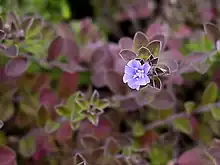Convolvulus prostratus
Convolvulus prostratus (Convolvulus pluricaulis[1]) is an herb found in India and Burma that is used in Ayurveda.[2] The Ayurveda preparation shankapushpi is, according to most sources, identical with Convolvulus prostratus, but some say shankapushpi(अपराजिता) is instead Clitoria ternatea. Shankhpushpi has been used traditionally as a brain tonic and is believed to help a wide range of issues. It is believed to have demonstrated potential for anxiolytic, relaxant, and anti-obsessive effects, as well as nootropic effects.
| Convolvulus prostratus | |
|---|---|
 | |
| Scientific classification | |
| Kingdom: | Plantae |
| Clade: | Tracheophytes |
| Clade: | Angiosperms |
| Clade: | Eudicots |
| Clade: | Asterids |
| Order: | Solanales |
| Family: | Convolvulaceae |
| Genus: | Convolvulus |
| Species: | C. prostratus |
| Binomial name | |
| Convolvulus prostratus Forssk. | |
| Synonyms | |
|
List
| |
Shankhpushpi has been found to help significantly with memory retention. In cholesterol-fed gerbils shankapushpi was observed to have significantly helped reduce serum cholesterol, low density lipoprotein cholesterol, and triglycerides after ninety days. Shankhpushpi also demonstrated a thyroid suppressing effect when administered (at 0.4 mg/kg) to mice with hyperthyroidism. It has been studied for use as anticonvulsant with mixed results.[3]
References
- Balkrishna, Acharya; Thakur, Pallavi; Varshney, Anurag (March 3, 2020). "Phytochemical Profile, Pharmacological Attributes and Medicinal Properties of Convolvulus prostratus – A Cognitive Enhancer Herb for the Management of Neurodegenerative Etiologies". Frontiers in Pharmacology. 11: 171. doi:10.3389/fphar.2020.00171. PMC 7063970. PMID 32194410.
- Aulakh, G. S.; Narayanan, S.; Mahadevan, G. (1988). "Phyto-chemistry and pharmacology of shankapushpi – four varieties". Ancient Science of Life. 7 (3–4): 149–156. ISSN 0257-7941. PMC 3336637. PMID 22557606.
- Agarawa, Parul; Sharma, Bhawna (March 2014). "An update on Ayurvedic herb Convolvulus pluricaulis Choisy". Asian Pacific Journal of Tropical Biomedicine. 4 (3): 245–252. doi:10.1016/S2221-1691(14)60240-9. PMC 3868798. PMID 25182446.